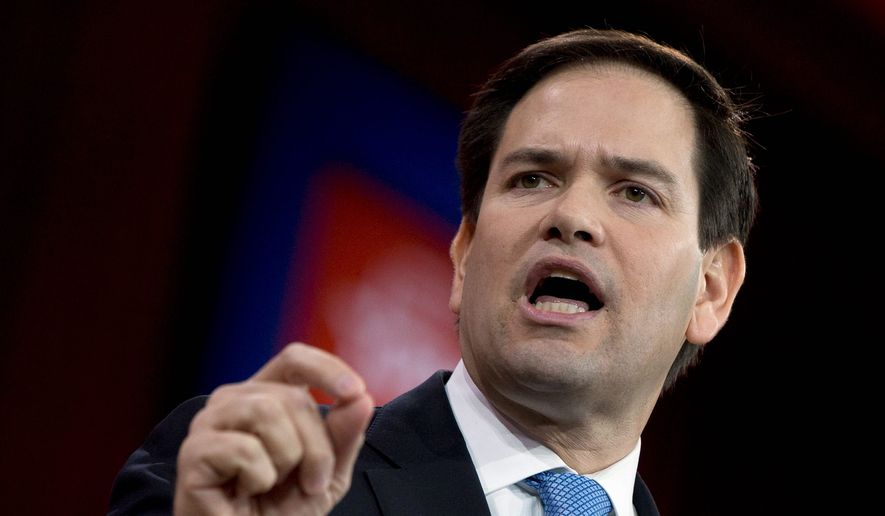As Sen. Marco Rubio prepares his presidential campaign, a pollster who specializes in surveying Latinos cast doubt on whether the Florida Republican will help the GOP make inroads with Hispanics.
Latino Decisions, founded by professors Gary M. Segura and Matt A. Barreto, said Mr. Rubio carries a negative rating among Hispanics into a presidential campaign, and said he also will suffer because of his opposition to Obamacare and to President Obama’s executive actions granting a deportation amnesty to millions of illegal immigrants.
“We find no evidence that Rubio’s candidacy will draw significant Latino support for his candidacy or for his party more generally,” the pollsters wrote Friday.
Mr. Rubio has an announcement scheduled for Monday in Miami, where the first-term senator is expected to declare he is running for the GOP’s 2016 presidential nomination.
He will become the second Cuban-American to declare, following Sen. Ted Cruz, Texas Republican, in what’s shaping up as a complex and diverse GOP field.
Some Republicans are hoping Mr. Rubio, who was one of the Gang of Eight senators who helped write the 2013 Senate immigration bill legalizing illegal immigrants, could make inroads with Hispanics, who have turned against the GOP over the last decade in presidential elections.
President George W. Bush won more than 40 percent of Hispanic votes en route to reelection in 2004, but Sen. John McCain saw that drop to 31 percent in his 2008 presidential run, and former Massachusetts Gov. Mitt Romney, the GOP’s 2012 nominee, garnered little more than a quarter of Hispanics’ support.
Mr. Rubio’s political operation declined to comment for this article.
Alfonso Aguilar, who was an immigration official during the Bush administration, discounted the Latino Decisions conclusions as biased, saying they tilt Democratic. He said the fact that the group was targeting Mr. Rubio suggests “they’re afraid of Marco Rubio.”
Mr. Aguilar, who is now director of American Principles in Action’s Latino Partnership, acknowledged that Mr. Rubio would suffer among Hispanics from the same stigma that attaches to the rest of the Republican Party and its immigration stances.
But he said Mr. Rubio’s work on the 2013 immigration bill gives him an opening that none of the other potential candidates, with the exception of former Florida Gov. Jeb Bush, the former president’s brother, will have.
Plus, Mr. Rubio can reach some voters others can’t: “He speaks Spanish fluently and can connect,” Mr. Aguilar said.
That contrasts with Mr. Cruz, who Mr. Aguilar said has not put the same effort into winning Hispanic voters, and who has alienated many of them by taking a strict enforcement-based approach to immigration.
“One is seen as conservative but hopeful and willing to risk his political capital on a tough issue, and the other, conservative as well, but just angry and negative,” Mr. Aguilar said.
The Latino Decisions analysis pointed to polling done on the eve of last year’s election of 4,200 Hispanic voters, and found 31 percent had a favorable view of Mr. Rubio, compared to 36 percent who had an unfavorable view. Democratic front-runner Hillary Rodham Clinton was viewed favorably by 64 percent of Hispanics in that same poll.
Familiarity didn’t help Mr. Rubio much. In his home state of Florida, he was viewed favorably by 39 percent of Hispanics and unfavorably by 42 percent, the pollsters said.
Susan McManus, a political science professor at the University of South Florida, said Mr. Rubio has had trouble making inroads with non-Cuban Hispanics in Florida, and that could carry over to a national race if he were the GOP’s nominee.
But she said Mr. Rubio does have some opportunities as well.
“There will be a number of Hispanics who are drawn to the idea of breaking a big barrier down, and that will grab some people’s attention,” she said.
Ms. McManus said that appeal will hold true particularly for younger voters, Hispanic or otherwise, who will be less enthusiastic about the “legacy” candidates such as Mrs. Clinton or Mr. Bush.
She said the 2016 contest is shaping up as the “freedom election,” where candidates will spar over themes ranging from religious freedom and marriage rights to privacy and drone policy.
“The degree to which Rubio can articulate freedoms that are more expansive than just Cuba, he may be able to grab young voters’ and young Hispanic voters’ attention,” she said.
• Stephen Dinan can be reached at sdinan@washingtontimes.com.




Please read our comment policy before commenting.